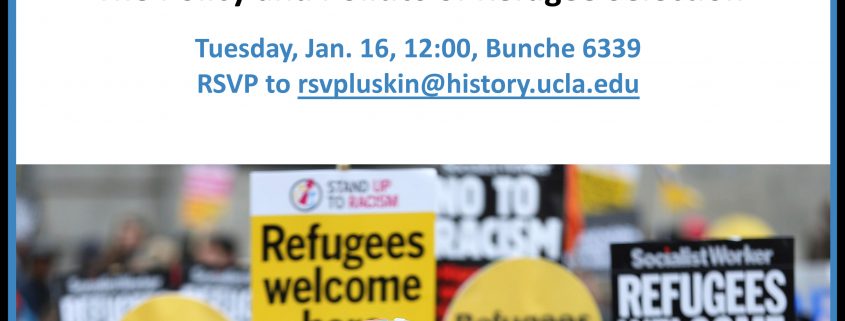
Luskin Center for History and Policy Workshop
January 16, 2018
“The Policy and Politics of Refugee Selection”
Molly Fee, Ph.D. Candidate, UCLA Department of Sociology
The fourth meeting of the monthly Luskin Center Workshop (rescheduled from December) addressed the subject of recent trends in refugee selection policy in the United States, under past and current presidential administrations. The session was led by Molly Fee, Ph.D. candidate in the UCLA Department of Sociology and a Luskin Center Innovation Fellow for 2017-2018.
Ms. Fee began the session by comparing and discussing recent data on refugee selection and resettlement in the United States. Several questions were raised. What motivates migration and the US government’s decision to accept refugees from different countries? What kind of temporal and political context is relevant in understanding refugee selection policy in the US?
Fee detailed the process of refugee selection and resettlement in the United States. She noted that, although the US accepts the highest number of refugees per year of any country, it drops to fourth place when the number is calculated on a per capita basis.
Current US policy dates back to the Refugee Act of 1980. That year also witnessed a major spike in refugees, mostly Cuban, to the United States. Since 1980 and until recent years, US refugee policy was largely focused on accommodating refugees from Russia and other Former Soviet States, especially after the collapse of the Soviet Union. In general, US refugee acceptance has tended to decline, rather than increase.
In the past decade, US policy has begun to transition its focus from the former Soviet Union to the refugee needs stemming in large part from the Middle East. Despite efforts under the Obama administration to reverse the trend, refugee numbers in the US were decreased in the wake of 9/11, and most recently, the Trump administration pushed, successfully, to severely decrease the number of refugees accepted in the US. Given the Trump Administration’s generally hostile posture toward immigration, the future of refugee acceptance in the US is murky at best.
Fee speculated that, despite the stipulation in the Refugee Act that refugees will be admitted who satisfy a “special humanitarian concern,” refugee policy in the US never lived up to this humanitarian goal.
The discussion that followed Fee’s presentation took up several issues. Participants recalled moments in which political figures sought to accept or deny refugees as a form of historical atonement, citing the recent example of German Chancellor Angela Merkel’s decision to accept North African and Syrian refugees as redress for Germany’s history of genocidal policy. Some participants believed that these kinds of justifications may be important in pushing leaders to accept refugees. Other participants believed that these justifications are merely rhetoric, not rooted in actual decision-making.
Another issue that arose was to what degree refugee selection policy is arbitrary. Is it possible that refugees are chosen merely because they had effective advocates for their cause?
In addition, participants questioned to what degree issues like climate change and globalization have begun to change existing discourse and policy on refugee selection in the US.



